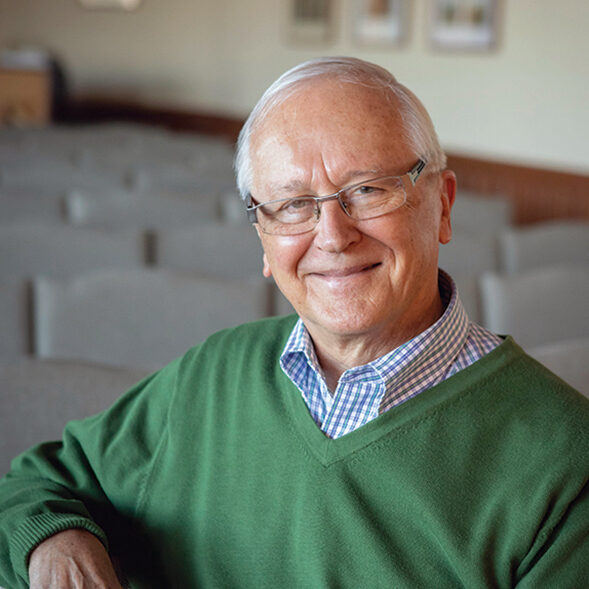Christianity is not just a label, a category, or a space to be filled in for some pollster. We are named after Christ. The shepherds heard the angels identify the baby as Christ (christos), the Lord. Both Mary and Joseph were told that the baby would be called Jesus (Luke 1:31; Matthew 1:21). That name meant he would “save his people from their sins.”
Both names—Jesus and Christ, the name the angels proclaimed—have deep significance. Names back then were more important than they are today. Now parents often choose a family name or a name that simply appeals to them from a long list of names.
After the angels used the name Christ, we don’t encounter it again until Jesus began his ministry. Then in Nazareth’s synagogue, Jesus found a passage from Isaiah (Luke 4:14-21). He quoted the prophet’s words, “The Spirit of the Lord is on me, because he has anointed (a form of christos in Greek) me to proclaim good news to the poor” (Isaiah 61:1,2). That word anointed identified the One who was to come—the Christ. He would be the Anointed One.
Those who came to worship on that Sabbath had no doubt heard the idea of anointing before. They knew how David, the high priest, and some of the prophets were anointed. They understood that the anointed one was someone who was dedicated to the Lord’s service. That person had the approval of the Lord God and the responsibility to carry out his God-given work. The Old Testament also hinted that the One who would come was the anointed promised deliverer.
This Lent we see him with clarity. He was anointed to die in our place.
Jesus took the occasion to quote this passage from Isaiah where the word anointed referred to him: “Today this scripture is fulfilled in your hearing” (Luke 4:21). Jesus claimed to be the Anointed One. Those in the synagogue were incensed by what Jesus said and were ready to kill him for claiming to be like David, the high priest, and the prophets—and, more than all of them, the Messiah, the Christ, the Anointed.
They failed to kill him that day, but it didn’t take long before others wanted him dead. The Pharisees began to plot his death when Jesus claimed to be Lord of the Sabbath and healed on the Sabbath to prove it (Matthew 12:1-14).
Others discovered that Jesus was indeed the Anointed One—the Christ. Peter confessed clearly what the disciples believed, “You are the Christ (christo), the Son of the Living God” (Matthew 16:16 EHV). Peter and the others believed Jesus was the Anointed One who came as God’s promised deliverer.
Peter and the others may have had a fuzzy vision of what Jesus had come to do. Jesus told them more than once that he would be handed over to the Jews, suffer and die, but then rise again. But even then, the disciples didn’t grasp it all until after it all happened.
This Lent we see him with clarity. He was anointed to die in our place. He is the Christ, anointed to finish our salvation.
After Jesus ascended, believers in Antioch were first called “Christians” (Acts 11:26). They were anointed (1 John 2:27) and connected with the Anointed One—the Christ. They preached Christ crucified and risen again (1 Corinthians 1:23). We are Christians in our world today. We too are associated with the Anointed One, the Christ. Our message is the same. It’s all about the Anointed One—Christ.
Author: John A. Braun
Volume 107, Number 03
Issue: March 2020
- We have love
- We have hope
- We have faith
- I come
- Love one another
- Palmetto palms and wrens
- Fathers
- Mother’s Day
- Believe the Word
- The Judas priority
- In Christ
- A thought: Mary
- Come, Lord Jesus!
- A thought: Here we stand!
- A thought: Obedience
- A thought: Hope
- A thought: Almighty God
- A thought: Scripture alone
- A thought: Their message to us
- A thought: The Ides of March
- A thought: The path of the righteous
- A thought: The Bible still matters
- A thought: Happy birthday, Brother!
- A thought: Change
- A thought: Our Father
- A thought: The difference
- A thought: Imperfect world, imperfect life
- A thought: Joy and peace today and everyday
- A thought: Good job!
- In God’s hands
- A thought: Outing death
- A thought: The Christ
- A thought: Trusting what we cannot see
- A thought: Partners
- Heirs of heaven
- Hope
- The Avengers and two lions
- Faith in Jesus
- God’s policy of love
- Lord, have mercy!
- Light in the darkness
- Why?
- The shroud
- A Lutheran Lent
- Where is God?
- Turning pages







